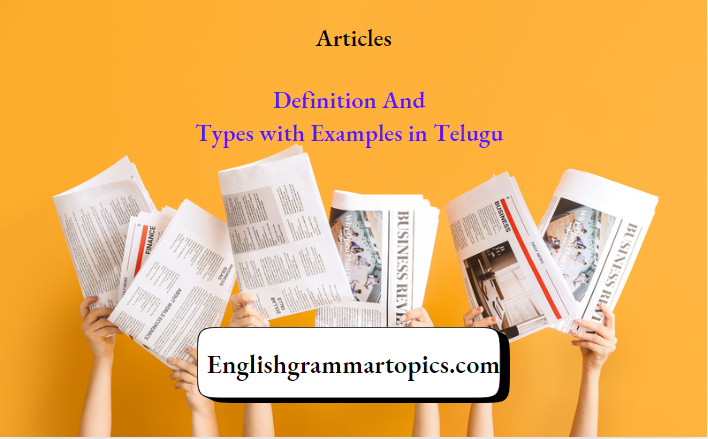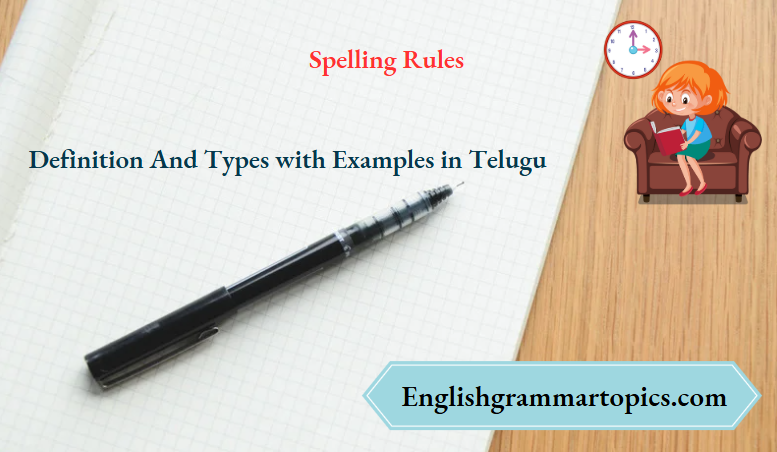అధ్యాయము 24
Idioms
206. ఒక ప్రతేకమైన పద్ధతిలో మరియు క్లుప్తంగా భావములను సునిశితంగా తెలుపుటను Idioms అంటారు.
207. చాలా verb పదముల విషయంలో వానివెంట prepositions లేక adverbs ఉన్నట్లయితే అచ్చట idiomatic భావము ఉద్భవిస్తుంది.
He backed up (supported) his friend’s claim. The present disturbances will soon blow over (pass off). The police produced evidence to bear out (substantiate) the charge of murder.
You must not build your hopes upon (rely upon) his promises.
The matter has been cleared up (explained).
I readily closed with (accepted) his offer.
He is ready to dispose of (sell) his car for Rs.1,50,000.
Rust has eaten away (corroded) the plate.
They fixed upon (chose) him to do the work.
My good behaviour so far gained on (won the favour of) the emperor that I began to conceive hopes of liberty.
The habit of chewing tobacco has been growing upon (is having stronger and stronger hold over) him. Please hear me out (i.e.”hear me to the end).
I have hit upon (found) a good plan to get rid of him. About an hour ago I saw a fellow hanging about (loitering about) our bungalow.
These events led up to (culminated in) the establishment of a republic.
During excavations one of the workmel1 lighted upon (chanced to find, discovered) a gold idol. During her long illness she often longed for (desired) death.
I could not prevail on (persuade, induce) him to attend Jhe meeting. For years I could not shake off (get rid of) my malaria.
I threatened to show him up (expose him). All eyes turned to him because he was the only person who could stave off (prevent, avert) the impending war.
He is sticking out for (pf;)rsists in demanding) better terms. I must think the matter over (i.e., consider it). Train up (educate) a child in the way he should go; and when he is old he Will not depart from it. That fellow trumped up (concocted, fabricated) a story.
Read and Learn More Correct usage of grammar
Bear: He seems to be well off (in comfortable circumstances).
Satish bore away (won) many prizes at the school sports. The new leader has been able to bear down (overthrow, crush) all opposition. His evidence bears out (confirms, corroborates) the evidence of the first witness.
In his misfortune God gave him strength to bear up (to keep up spirits, not to despair). A religious hope bears up (supports) a man in his trials.
His evidence did not bear upon (was not relevant to) the inquiry. I trust you will bear with (have patience with, show forbearance to) me a few minutes more.

Break: He broke down (failed) in the middle of his speech.
He broke off (stopped suddenly) in the middle of his story.
I gave him no cause to break with (quarrel with) me.
The burglars broke into (entered by force) the house.
Bring: His folly has brought about (caused) his ruin.
Idleness and luxury bring forth (produce, cause) poverty and want. He brought forward (adduced) several cogent arguments in support of his scheme.
That building brings in (yields as rent) Rs. 7000 a month. Our teacher often tells us a story to bring out (show) the meaning of a lesson. The publishers have recently brought out (published) a cheap edition of their new dictionary.
He found great difficulty in bringing her round (converting her) to his views. She brought up (reared) the orphan as her own child.
Call: His master called for (demanded) an explanation of his conduct.
New responsibilities often call out (draw forth) virtues and abilities unsuspected before.
Call in (summon, send for) a doctor immediately.
He called on me (paid me a brief visit) yesterday.
The old man could not call up (recollect) past events.
Carry: He agreed to carry out (execute) my orders.
His passion carried him away (i.e., deprived him of self-control).
His son carried on (managed) his business in his absence.
Many persons were carried off (killed) by plague.
Cast: The ship was cast away (wrecked) on the coast of Africa.
He was much cast down (depressed) by his loss.
Come: How did these things come about (happen)? How did you come by (get) his purse?
When does the Convocation come off (take place) ?
At last the truth has come out (transpired).
The taxes come to (amount to) a large sum.
The question came up (was mooted or raised for discussion)
before the Municipal Corporation last week.
I expect he will come round (recover) within a week.
I hope he will come round (agree) to our views.
Cry: Men of dissolute lives cry down (depreciate) religion, because they would not be under the restraints of it.
He cried out against (protested against) such injustice. That young author is cried up (extolled) by his friends.
Cut: He was cut off (died) in the prime of life.
You must cut down (reduce) your expenditure. He is cut out for (specially fitted to be) a sailor. His wife’s death cut him up (afflicted him, distressed him) terribly.
Do: I am done for (ruined).
Having walked twenty miles, he is quite done up (fatigued, exhausted).
Fall: At last the rioters fell back (retreated; ‘yielded).
At my friend’s tea-party I fell in with (met accidentally) a strange fellow. The measure falls in with (happens to meet) the popular demand. The scheme has fallen through (failed) for want of support.
I am told the two brothers have fallen out (quarrelled). It is said that the standard of efficiency in public service has recently fallen off (deteriorated). In the second school-term the attendance fell off (diminished).
Get: His friends expected that he would get off (escape) with a fine.
It is hard to get on with (agree or live sociably with) a suspicious man. The thief got away (escaped) with my cash-box. I can’t get out (remove) this stain.
The revolt of the tribal chiefs has been got under (subdued). The dog tried to get at (attack) me.
He has got through (passed) his examination. They soon got the fire under (under control) by pouring buckets of water over it. You were lucky to get out of (escape from) his clutches.
Give: We are credibly informed that the murderer has given himself up (surrendered himself) to the police.
The doctors have given him up (i.e., have no hope of his recovery).
Soon after it was given forth (published, noised abroad), and believed by many, that the King was dead. The fire gave off (emitted) a dense smoke.
The strikers seem determined, and are not likely to give in (submit, yield).
It was given out (published, proclaimed) that he was a bankrupt. The horses gave out (were exhausted) at the next milestone. The rope gave way (broke, snapped) while the workmen were hauling up the iron pillar.
He would not listen to me at first, but at last he gave way (yielded.)
The Governor gave away (distributed, presented) the prizes.
Give over (abandon) this foolish attempt.
In his cross-examination, he ultimately gave himself away (betrayed himself).
Go: You cannot always go by Judge from) appearances.
It is a good rule to go by (to be guided by).
He promised to go into (examine, investigate) the matter.
Have you anything to go upon (i.e., any foundation for your statement)?
We have no data to go upon (on which to base our conclusions).”
The story won’t go down (be believed).
The concert went off well (was a success).
The auditor went over (examined) the balance sheet.
The poor woman has gone through (suffered) much.
I must first go through (examine) the accounts.
Hold: The rebels held out (offered resistance) for about a month. He holds out (gives) no promise of future prospects.
They were held up (stopped on the highway and robbed) by bandits.
The subject is held over (deferred, postponed) till next meeting.
Keep: A few boys were kept in (confined after school-hours).
I was kept in (confined to the house) by a bad cold.
They kept up (carried on) a long conversation.
Little disputes and quarrels are chiefly kept up (maintained) by those who have nothing else to do.
He is trying his best to keep up (maintain) the reputation of his family. The rubber syndicate keeps up (maintains) the price. She kept on (continued) talking. I shall keep back (conceal) nothing from you.
Knock: He has knocked about (wandered about) the world a great deal.
The dressing-table was knocked down (sold at an auction) for Rs. 900.
We were greatly knocked up (exhausted) after our steep climb.
Lay: The rebels laid down (surrendered) their arms. He had laid out (invested) a large sum in railway shares. Foolish people, who do not layout (spend) their money carefully, soon come to grief.
He is laid up (confined to his bed) with fever. He resolved to lay by (save for future needs) a part of his income.
Let: I was let into (made acquainted with) her secret.
This being his first offence he was let off (punished leniently) with a fine.
Look: His uncle looks after (takes care of) him. He looks down upon (despises) his poor cousins. Look up (search for) the word in the dictionary. The old man is looking forward to (expecting with pleasure) the visit of his grandchildren.
I will look into (investigate) the matter. I look on (regard) him as my son.
Some look to (rely on) legislation to hasten the progress of social reforms. Look to (be careful about) your manners. Prices of piece-goods are looking up (rising). Things are looking up (improving). His friends look up to (respect) him. He will not look at (i.e., will reject) your offer.
Make: Contentment makes for (conduces to) happiness. He made over (presented, gave in charity) his bungalow to the Islam Orphanage.
I cannot make out (discover) the meaning of this verse.
I cannot make out (read, decipher) his handwriting.
You have failed to make out (prove) your case.
Some time ago the two brothers quarrelled, but they have now made it up (become reconciled).
Pass: He generally passed by (overlooked) the faults of his subordinates.
The crew of the boat passed through (underwent) terrible sufferings.
He passed himself off as (pretended to be) a nobleman.
He poses all for (is regarded as) a great Sanskritist.
PICK: The Committee picked out (selected) the best players for the team.
He lost twenty pounds in sickness, but is now picking up (regaining or recovering health).
Pull: Unless we pull together (co-operate, work together in harmony) we cannot succeed.
My cousin pulled through (passed with difficulty) the examination.
The doctor says the patient will pull through (recover from his illness).
It is far easier to pull down (demolish) than to build up.
He was pulled up (scolded, rebuked) by the President
He puts on (assumes) an air of dignity.
Please put out (extinguish) the light.
He was put out (vexed, annoyed) when I refused his request for a loan.
The plaintiff was put out (disconcerted) when the suit was dismissed.
He tried to put me off (evade me, satisfy me) with promises.
He has put in (made, sent in) a claim for compensation.
While travelling I had to put up with (endure) a good deal of discomfort.
I cannot put up with (tolerate) his insolence.
They put him up to (incited him to) mischief.
I am sorry to put you to (give you) so much trouble.
PUT: He put off (postponed) his departure for a week.
The measure was put through (passed) without opposition.
Run: On account of overwork he is run down (enfeebled).
He always runs down (disparages) his rivals.
The lease of our premises has run out (expired, come to an end).
He has run through (squandered away) his fortune.
The tailor’s bill has run up to (amounted to) a large amount.
He has run into (incurred) debt.
While turning the corner I ran against (chanced to meet) an old friend.
Recently my expenses have run up (increased) considerably.
The cistern is running over (overflowing).
See: I saw through (detected) the trick.
It is hard to see into (discern) his motive.
His friends were present at the station to see him off (witness his departure)
Set: The High Court set aside (annulled) the decree of the lower court.
He immediately set about (took steps towards) organizing the department.
He set off (started) for Peshawar early this morning.
The frame sets off the picture (i.e., enhances its beauty by contrast).
He has set up (started business) as a banker.
I have enough capital to set me up (establish myself) in trade.
He hired a palatial bungalow and set up for (pretended to be) a millionaire.
I was obliged to set him down (snub him).
You may set down (charge) his loss to me.
Who set you on (instigated you) to do it?
These seats are set apart (reserved) for ladies.
In his speech on prohibition, he set forth (explained, made known) his views at length. The robbers set upon (attacked) the defenseless travelers. Winter in England sets in (begins) about December.
Speak: In this city there is no free library to speak of (worth mentioning).
I was determined to speak out (express my opinion freely).
Stand: They are determined to stand up for (vindicate, maintain) their rights.
Let this matter stand over (be deferred or postponed) for the present.
It is hard but I think I can stand it out (endure it to the end without yielding).
He is always standing up for (championing the cause of) the weak find oppressed.
We shall be formidable if we stand by (support) one another.
Strike: He is struck down with (attacked by) paralysis.
The Medical Council struck off (removed) his name from the register of medical practitioners.
While we were planning a family picnic, my sister struck in (interrupted) with the suggestion that we invite our neighbour’s children as well.
Take: The piano takes up (occupies) too much room.
It would take up (occupy) too much time to tell you the whole story.
He takes after (resembles) his father.
At present I am reading the Essays of Bacon, but it is sometimes difficult to take in (comprehend, understand) his meaning.
Recently he has taken to (become addicted to) opium eating.
Talk: We talked over (discussed) the matter for an hour.
I hope to talk him over (convince him by talking) to our view.
Tell: I am afraid your antecedents will tell against you (i.e., prove unfavorable to you). The strain is telling upon (affecting) his health.
Throw: My advice was thrown away (wasted) upon him, because he ignored it The bill was thrown out (rejected) by the Assembly. In disgust, he threw up (resigned) his appointment When he became rich he threw over (abandoned or deserted) all his old friends.
Turn: The factory turns out (produces, manufactures) 20,000 lbs of cloth a day. If he is lazy, why don’t you turn him off (dismiss him)?
He turned out (proved) to be a sharper.
His very friends turned against (became hostile to) him.
Who can say what will turn up (happen) next?
He promised to come, but he never tumed up (appeared).
Work: We tempted him with many promises, but nothing would work on (influence) him. He worked out (solved) the problem in a few minutes.
He is sure to work up (excite) the mob. He worked upon (influenced) the ignorant villagers.
Idioms (Continued)
208. ఈ క్రింది idioms క్షుణ్ణంగా చదివినట్లయితే idiomatic phraseology లో metaphor (ఉపమానాలంకారము) enter అవుచున్నదని తెలుస్తుంది.
1. In spite of all his brag he had to eat humble pie (to apologize humbly, to yield under humiliating circumstances). Take Care what you say! You will have to eat your words (to retract your statements, to take back what you have said).
I am prepared to meet you half-way (come to a compromise with you).
It is silly to meet trouble half-way (i.e., to anticipate it; to worry about it before it comes).
This unexpected new difficulty put me on my mettle (roused me to do my best) This is of a piece with (in keeping with) the rest of his conduct
He is not worth his salt (quite worthless) if he fails at this juncture.
The cost of living has increased so much that he finds it difficult to make both ends meet (to live within his income).
As a social reformer, he set his face against (sternly opposed) nautch parties. At the battle of Marengo, Napoleon was within an ace of (on the point of) defeat (i.e., he was very nearly defeated).
2. The belief in witchcraft is losing ground (becoming less powerful or acceptable).
Lord Roberts first won his laurels (acquired distinction or glory) in India.
It was in parliamentary debate that he won his spurs (made his reputation as a politician).
When the prodigal returned to his father’s house, he was received with open arms (with a warm welcome). How can you trust a man who plays fast and loose (says one thing and does another) ?
I took him to task (rebuked him) for reading “penny dreadfuls”. He turned a deaf ear to (disregarded) my advice. That argument will not hold water (stand scrutiny i.e., it is unsound).
He is determined to achieve his object by hook or by crook (by fair means or foul; by any means he can). To all intents and purposes (practically, virtually) the Prime Minister of Nepal was the ruler of the country.
3. The singer, having a slight cough, was not in voice (unable to sing well) at the concert. These two statements do not hang together (i.e., are not consistent with each other). This is more than flesh and blood (human nature) can endure.
He accepted my statement without reserve (fully, implicitly). I must take exception to (object to) your remark. He is indulgent to a fault (ie., he is over-indulgent; so indulgent that his indulgence is a fault).
The belief in efficacy of vaccination is gaining ground (becoming more general). From his attitude it is clear that he wants to pay off old scores (to have his revenge).
He has been working on and off (at intervals) several years to compile a dictionary. He visits me off and on (now and then, occasionally).
4. At least on the question of child-marriage we are at one (of the same opinion). He took my advice in good part (without offence; i.e., he did not resent it). It was he who put a spoke in my wheel (thwarted me in the execution of my design).
At an early age he made his mark (distinguished himself) as a chemist.
I have it at my fingers’ ends (know it thoroughly). The new play has fallen flat (met with a cold reception). Where discipline is concerned I put my foot down (take a resolute stand).
It is a matter of gratification to me that he has turned over a new leaf (changed for the better, begun a different mode of life). I have made up my mind (resolved, decided) to retire from business. This puts me in mind (reminds me) of an amusing incident.
5. There’s no love lost between them (i.e., they are not on good terms, they dislike each other). Many people in that country live from hand to mouth (i.e., without any provision for the future).
Steady work is sure to be rewarded in the long run (eventually, ultimately). Whatever else one may say of him, no one dare call in question (challenge, express a doubt about) his honesty of purpose.
The police came to the scene in the nick of time (just at the right moment, opportunely).
She stood by him through thick and thin (under all conditions, undaunted by anything). His partner threw cold water on his scheme (discouraged him by showing indifference to it). He can turn his hand to (adapt or apply himself to) anything. The Sultan rules his subjects with a high hand (oppressively). He is hand and glove (on very intimate terms) with my cousin.
6. He turns even his errors to account (i.e., profits by them).
He is accused of sifting on the fence (halting between two opinions, hesitating which side to join). It is all one (just the same) to me whether he lives in Mumbai or Kolkata. What is the point at issue (in dispute) ?
The inquiry has brought to light (disclosed) some startling facts.
He is not fit to hold a candle to (not to be named in comparison with) his predecessor. He burnt his fingers (got himself into trouble) by interfering in his neighbour’s affairs.
I suspect the fellow lives by his wits (i.e., he has no settled means of subsistence but picks up a living by deceit or fraud). He bids fair (seems likely) to rival his father as a lawyer. He strained every nerve (used his utmost efforts) to get his friend elected.
7. When I saw him last he was beside himself (out of his mind) with grief.
He spent over it much time and energy, and lost a large sum into the bargain (in addition, besides). When I entered the house everything was at sixes and sevens (in disorder or confusion).
Recently he has been giving himself airs (behaving arrogantly).
The attack might be launched at any time, so you must be on the alert (on your guard, ready to act). Retrenchment is the order of the day (the prevailing state of things) in every public and private office.
In the manufacture of dyes the Germans bear the palm (are pre-eminent). Agriculture in America has kept pace with (progressed at equal rate with) industrial activities. This text-book of chemistry is quite out of date (obsolete). This is the most up-to-date (modem, recent) book on the subject:
8. What you say has no bearing on the subject in hand (under discussion or consideration).
It speaks volumes for (serves as a strong testimony to) Dr. Johnson’s industry that he should have compiled the dictionary without anyone’s help. Poor fellow! He is hoping against hope (hoping even when the case seems hopeless).
I am told he has got into hot water (into trouble). Ultimately I got the better of him (overcame him). He was found guilty, but, he got off easy (got a light sentence). I wash my hands of the whole matter (i.e., I refuse to have anything more to do with it).
The situation seems to have got quite out of hand (beyond control).
It is said that he has a finger in the pie (has something to do with the affair, is mixed up in the affair). That fellow sets everybody by the ears (i.e., he is a mischief-maker).
9. You have hit the nail on the head (said or done exactly the right thing).
Today he is in high spirits (cheerful, joyful). How is that? You seem out of spirits (gloomy, sad).
Hello! My lad; you look as if you’ve been in the wars (hurt yourself). I suspect he has an axe to grind (private ends to serve, a personal interest in the matter).
The news of the Amir’s death spread like wild fire (spread rapidly). He took to heart (was deeply affected by) the death of his wife. He was disappointed, but he took heart (cheered himself up) and tried again.
He has his heart in the right place (means well, is of a kindly and sympathetic disposition). He is coming to the front (attaining prominence, becoming conspicuous) in public life.
10. He is not a great lawyer but he has the gift of the gab (a talent for speaking). Prohibition is gall and wormwood (hateful) to distillers.
The strikers have thrown out of gear (disturbed the working of) many of our important industries.
Though ,he addressed his boys for a few minutes only, the earnestness with which he spoke went home to them (deeply appealed to them).
Just now he is simply coining money (making money very rapidly, earning large sums easily).
The screen is in character (in keeping) with the rest of the furniture.
He is not in the good books of (in favour with) his master, I am afraid I am in his bad books (out of favour with him). I am quite at sea (perplexed, at a loss what to do or how to act).
He does not understand that he stands in his own light (acts against his own Interests, hinders his own advancement).
11. Although he denies it, I think he is behind the scenes (in the secret, in possession of facts not generally known).
You are sure to put your foot in it (to blunder, to get into a scrape) if you meddle in his affairs. I begged him to reconsider his decision, but he put his foot down (remained firm; refused to yield). He asked me to dine with him, but I had to foot the bill (pay for it).
We shall fight tooth and nail (with all our power) for our rights. The property belonged to a Nawab, but recently it changed hands (became someone else’s property). He is by long odds (most decidedly) the greatest of living mathematicians.
The thief took to his heels (ran off) on seeing a policeman.
Our school is within a stone’s throw of (at a short distance from) the railway station. A few days before his death, he made a clean breast of (confessed without reserve) everything connected with that affair.
12. He stood his ground (maintained his position) against his adversary.
He keeps in touch with (has intimate knowledge of) the latest developments in wireless.
That is where the shoe pinches (where the difficulty or trouble lies).
I told him that I was prepared to show my hand (to reveal my plan of action, to let out my designs) provided he agreed to do the same.
The medical graduates to a man (i.e., everyone without exception) voted in favour of him.
He insisted on his orders being carried out to the letter (exactly, with adherence to every detail). For a long time he kept his father in the dark (in ignorance) about the true state of affairs. Success has turned his head (made him quite vain). His star is in the ascendant (i.e., fortune favours him).
13. The scheme appears worthless at the first blush (at first sight).
It was his constant prayer that he might die in hamess (continue to the last in his business or profession).
He has too many irons in the fire (i.e., he is engaged in too many enterprises at the same time). The Sikh soldiers were true to their salt (faithful to their employers). The latest police report says that the situation is now well in hand (under control).
He was at his wit’s end (quite puzzled, at a complete loss how to act).
What’s the matter with him? He is falling foul of (quarrelling with) everybody.
I am sure he won’t go back on (fail to keep) his word. The directors of the company put their heads together (consulted one another) to formulate a new scheme. Do not give ear to (listen to) a tale-bearer.
14. So far as I could see there was nothing out of the way (strange, eccentric) in the behaviour of that stranger.
A spirit of unrest is in the air (prevalent, found everywhere). The controversy is likely to create bad-blood (ill-feeling, bitterness) between the two communities. The rebels surrendered at discretion (unconditionally).
The letter is meant to be read between the lines (ie., it has a hidden or unexpressed meaning, not apparent on the surface). He was murdered in cold blood (ie., not in the heat of passion or excitement, but deliberately).
Let us have your terms in black and white (in writing).
On the approach of a policeman the bully showed a clean pair of heels (ran away). He has politics on the brain (constantly in his thoughts, as a sort of monomania). This will suit you to a T (exactly).
15. His eldest son, a spendthrift, is a thorn in his side (a constant source of annoyance to him).
I smell a rat (have reason to suspect something). I nipped his scheme in the bud (i.e., made it fail before it could mature). What you propose is out of the question (not to be thought of, impossible).
The performance was not up to the mark (quite satisfactory). The long and the short of it (the simple fact, the whole matter in a few words) is that I do not want to deal with that new firm.
I am told he is in the running (i.e., he has good prospects in the competition). Now that he has nothing to fear from me, he is showing his teeth (adopting a threatening attitude).
He changed colour (turned pale) when I questioned him about his antecedents. He had made a great mistake in championing their cause, but, having done it, he stuck to his guns (remained faithful to the cause).
16. This is the time to take stock of (to survey) the whole situation.
What’s the good of entering into negotiations with a man of straw (a man of no substance or consequence)?
The election campaign is just now in full swing (very active).
He is not wise enough to keep his own counsel (to preserve a discreet silence, to be reticent about his opinions or affairs).
That young fellow was born with a silver spoon in his mouth (born in wealth and luxury). It stands to reason (is quite clear, is an undoubted fact) that the rich never have justice done them in plays and stories; for the people who write are poor.
This suit-case has stood me in good stead (proved useful to me) in my travels. You have taken the wind out of my sails (made my words or actions ineffective by anticipating them). I took him to task (reproved him) for his carelessness. I have a bone to pick with you (some cause of quarrel with you).
17. It will do at a pinch (in case of emergency, if hard pressed).
When the opportunity came I paid him back in his own coin (treated him in the same way as he had treated me).
Just now my hands are full (I am very busy). It is generally believed that he had a hand (was concerned) in the plot. Explorers in the arctic regions take their lives in their hands (undergo great risks).
Naturally he fights shy of (avoids from a feeling of mistrust, dislikes) his young nephew, who is a gambler. All his schemes ended in smoke (came to nothing).
The police left no stone unturned (used all available means, adopted every possible method of search) to trace the culprits. Later on he became unpopular because he tried to lord it over (to domineer over) his followers.
As he was growing old, his friends persuaded him to rest on his laurels (to retire from active life).
18. The champion will have to look to your laurels (take care not to lose your pre-eminence).
I am tired of hearing him harp on the same string (dwell tediously on the same subject). His blood ran cold (i.e., he was horrified) when he heard that his friend was murdered.
1 gave him a piece of my mind (scolded him).
The dog is as good as (practically) dead.
He was as good as his word (i.e., kept his promise).
The child was as good as gold (i.e., very good).
You will have to make good the loss (to compensate me for the loss).
He kicked up a row (made great noise or fuss)..
He seems ill at ease (uneasy, anxious, uncomfortable).
19. The old man is hard of hearing (somewhat deaf). It will go hard with him (ie., he will suffer severely) if he keeps company with that fellow.
People say that Mr. X, the banker, is on his last legs (on the verge of ruin).
I can make neither head nor tail (nothing) of it.
You’ll never get the better of (gain an advantage over) that rascal: with him it’s always, ‘Heads I win, tails you lose’ (i.e., in any case he will be the winner).
By his advocacy of widow-remarriage, he stirred up a hornet’s nest (excited the hostility or adverse criticism of a large number of people):
He made great claims for his discovery; but it turned out to be a mare’s nest (a delusion, a worthless thing).
On the very first night she brought down the house (called forth general and loud applause) by her superb acting. He is every inch (entirely, completely) a gentleman.
You have done the handsome thing by him (behaved towards him in a magnanimous manner) in accepting his apology and foregoing the claim for damages.
20. He proved his worth by rising to the occasion (showing himself equal to dealing with the emergency).
For some days the new professor lectured over the heads of (above the comprehension of) his pupils. He knows the ins and outs (the full details) of that affair.
He is over head and ears (deeply) in love (or, in debt). Beyond all question (undoubtedly) she is a great singer. You want to see him? Out of the question! (i.e., impossible).
The two friends agreed to differ (gave up trying to convince each other)
after discussing the question for about an hour. Since that day he has been in bad odour (out of favour, in bad repute) with his neighbours.
Intimate friends need not stand on ceremony (act with reserve, insist on strict rules of etiquette beir j observed). He went out of his way (took special trouble) to oblige me.
21. I am afraid you two are at cross-purposes (misunderstand each other). I trusted him and he played me false (deceived me, betrayed me).
He is a shrewd mal”), and it will not be easy to draw him out (to elicit information from him).He made light of (treated lightly) his friend’s warning.
The proposal was rejected with one voice (unanimously). The figures which he quoted were shown to be incorrect, and this took the edge off his argument (made his argument ineffective).
We had on the way tea of a kind (of a: poor kind, i.e., tea that scarcely deserved the name). I repaid his insolence in kind (in the same way, i.e., with insolence). Beware of that fellow! He will stick at nothing (is unscrupulous and will do anything to accomplish his purpose).
He is not the man to pocket an affront (to receive or submit to it without retaliating or showing resentment).
22. I am out of pocket (a loser) by the transaction.
The fate of the accused hangs in the balance (is undecided). He is a man of well-balanced (reasonable, moderate) opinions; He was carried off his feet (was wild with excitement) when he was declared to have won the first prize. He made the most of his opportunity (i.e., used it to the best advantage).
That house is put on the market (offered for sale). He sometimes works nine hours at a stretch (continuously). By his skill in arguing he carried his point (defeated his adversaries in debate). He is serving his time (going through an apprenticeship) in a bank. Serves you right (i.e., you’ve got your deserts)!
23. I shall manage to serve him out (to retaliate upon him, to have my revenge on him).
He is working against time (with utmost speed). This year the mango-crop has fallen short of my expectations (i.e., has disappointed me). While the members of the committee were discussing questions of finance, I felt like a fish out of water (like one out of his element; i.e., in a strange situation).
A good student works steadily, not by fits and starts (irregularly, capriciously, without steady application). He has made his fortune and now takes things easy (does not work hard).
Mr. X first introduced the system of payments by installments, and shortly afterwards others took a leaf out of his book (imitated him, profited by his example).
The Secretary of the Company was charged with cooking the accounts (preparing false accounts). You should take into account (consider) his past services.
You must lie in the bed you have made (take the consequences of your own acts; suffer for your own misdeeds).
24. He thinks better of it now (le., he has thought more carefully about it and come to a wiser decision). I am sure he means business (is In earnest).
I cannot give you a definite reply on the spur of the moment (at once, without deliberation).
It is the thing (the proper thing) to do. I see you know a thing or two (are wise or cunning). He took his failure to heart (i.e., felt it deeply: grieved over it). It goes to his heart (touches him deeply) to see so much misery.
The offer holds good (remains binding, is valid) for two days. He is leaving India for good (permanently). It will go hard with him (prove a serious matter for him) if his partner retires from business.
25. Do you expect me to be at your beck and call (under your absolute control)?
I am afraid he is burning the candles at both ends (overtaxing his energies). Let us now bury the hatchet (cease fighting, make peace), and work for the advancement of the country.
Mr. X, who is one of the trustees of a certain big charity, is suspected of feathering his won nest (making money unfairly). It is reported that some ruffians laid hands on (assaulted) him while he was returning home.
It is suspected that he had a hand in (was concerned in) the plot.
As usual he is blowing his own trumpet (praising himself). The excuses will not pass muster (will not be accepted as satisfactory).
As a diplomat he was head and shoulders (very much) above his contemporaries. Old sets of the Encyclopedia Britannica are a drug in the market (unsalable from lack of demand).
26. The foolish young man made ducks and drakes of (squandered) his patrimony.
She knows French after a fashion (to a certain degree, not satisfactorily).
It is all Greek (or Hebrew) to me (i.e., something which I do not understand). The thief was caught red-handed (in the very act of committing the theft).
Late in life he tried his hand (made an attempt) at farming. What you say is neither here nor there (foreign to the subject under discussion, irrelevant).
Even his old friend Smith, who had been indebted to him for many favours in the past, gave him the cold shoulder (treated him in a cold and distant manner).
If we are to give credence to rumours, another great war is on the cards (not improbable). While he spoke, the audience hung on his lips (listened eagerly to his words). The Speaker urged the Committee to take drastic action, but they ‘hung fire (were reluctant; hesitated).
27. He stands well with (is well thought of by) his master.
He claims that he has given chapter and verse (full and precise reference to authority) for every statement made in his book. The editor of that paper is accused of giving a false colouring to (misrepresenting) the incident.
Throughout his speech the boys were all ears (deeply attentive). I Was all eyes (eagerly watching) to see what he would do. I know my friend keeps a good table (provides luxurious food, entertains his guests sumptuously).
With a small income and a large family to maintain, he finds it rather difficult to keep his head above water (to keep out of debt).
He will never set the Thames on fire (do some remarkable or surprising thing). The scheme came to grief (failed) owing to want of foresight.
You will come to grief (be ruined) if you follow his advice.
28. I keep the fellow at arm’s length (at a distance; i.e., I hold aloof from him).
He is keeping up appearances (keeping up an outward show of prosperity) although he has lost his whole fortune.
Last year when the prince came of age (reached the age of twenty-one) he was installed on his father’s gadi.
Don’t trust those men; they are villains to the backbone (in every way).
You shall go, bag and baggage (with all your belongings. i.e., altogether, completely).
The account of the murder made her blood creep (filled her with horror).
That territory is a bone of contention (a subject of dispute) between the two countries.
He took away my breath (very much surprised me) when he coolly proposed that I should buy votes. Since his easy success in the elections, he has become swollen-headed (conceited).
29. Wherever he addressed public meetings he carried all before him (was completely successful). The cashier, having admitted defalcation, was given in charge (handed over to the police).
“If thine enemy be hungry, give him bread to eat, and if he be thirsty, give him water to drink; for thou shalt heap coals of fire upon his head (return good for evil, and make him ashamed of his enmity) and the Lord shall reward thee.”
It is mean to crow over (to triumph over) a fallen foe. He took up the cudgels for (defended vigorously) his friend. He is currying favour (using mean acts to ingratiate himself) with his rich neighbour.
If you endorse that promissory note, you will cut your own throat (ruin yourself). His father cut him off with a shilling (disinherited him by bequeathing a trifling sum). While he was speaking his father cut him short (interrupted him).
30. The witness cut a poor figure (produced a poor impression) in his cross-examination.
When he met me in the street, he cut me dead (deliberately insulted me by ignoring me). That Act is a dead letter (no longer in force). A great many faults may be laid at his door (imputed to him), but he is certainly not dishonest.
We must draw the line (fix the limit) somewhere. The cost of the new building should not exceed two lakhs. Printing is not in my line (is out of my province).
He is in the cotton line (i.e., he follows that trade). I don’t expect him to see eye to eye (to be in complete agreement) with me on the question of Prohibition.
He failed to get elected, but put a good face on (bore up courageously) his defeat. His speech on economic reform fell flat (caused no interest, produced no effect).
31. The joke fell flat (caused no amusement).
It is a far cry (a long way off) from Delhi to New York. It is a far cry (no easy transition) from autocracy to democracy. He is far and away (very much) the better of the two players.
The story of the shipwreck, as narrated by one of the survivors, made my flesh creep (horrified me). A Pathan is an ugly customer (a formidable person to deal with) when his blood is up (he is excited).
She is a delicate woman but has to rough it (to endure hardship) to support her family. He pins his faith to (places full reliance upon) technical education.
He sometimes tells lies, so people take his statements with a grain of salt (doubt). He is not the sort of man to let the grass grow under his feet (to remain idle, to procrastinate).
32. It’s no use splitting hairs (disputing over petty points, quibbling about trifles).
He is a great hand at (expert at) organizing public meetings. By your strange conduct you will give a handle to (furnish an occasion for) suspicion and scandal. He knows what he is about (is far-sighted and prudent).
You can rely on him; he knows what’s what (is shrewd and experienced, knows the ways of the world). Mussolini seems to bear a charmed life (to be invulnerable, as he escapes death in an almost miraculous manner).
When the Arabs conquered Persia, some Persians, it is safe to say, embraced Islam for loaves and fishes (material benefits). It never occurred to me that you would leave me in the lurch (desert me in my difficulties, leave me in a helpless condition).
In everything that he does he has an eye to the main chance (his object is to make money, he regards his own interests). The bank won’t accept the guarantee of a man of straw (a man of no substance).
33. His observations were beside the mark (not to the point, irrelevant).
Not to mince matters (to speak unreservedly), some of these pundits are mere charlatans.
His adversaries moved heaven and earth (made every possible effort) to get him dismissed. Do your worst! I nail my colours to the mast (refuse to climb down or surrender).
Stick to your colours (refuse to yield, be faithful to the cause), my boys!
The murdered man was found in a state of nature (naked). This coat fits you to a nicety (exactly).
He refused to be led by the nose (to follow submissively). His wife, who was the daughter of a millionaire, tumed up her nose at (regarded with contempt) her husband’s proposal to buy a Ford car. Don’t thrust your nose into (meddle officiously in) my affairs.
34. He is such an absent-minded fellow that he does not know what passes under his nose (in his very presence).
Successive ministers have found the question of employment a hard nut to crack (a difficult problem to solve). This gentleman, having worked successfully in the business line for several years, is now resting on his oars (stopping work for a time and having rest).
A dispute in that colliery came to a head (reached a crisis) this week.
The recent outbursts of murderous rioting should warn the labour agitators that they are playing with fire (trifling ignorantly with matters liable to cause trouble or suffering).
During the War, he made a pile (made a fortune). The famous libel case brought into play (gave an opportunity for the exercise of) his forensic abilities.
I admit that he pleaded the cause of the poor very eloquently; but will he put his hand in his pocket (give money in charity)? To small purpose (without much practical benefit) was the Commission appointed, if its main recommendations are not adopted. Nowadays flying is all the rage (extremely popular).
35. He is rather blunt, but his heart is in the right place (he is faithful and true hearted).
He is regarded as his chief’s right-hand man (most efficient assistant).
His letters to his ward speak volumes for (serve as strong testimony to) his forbearance and good sense. The new cotton mill is mortgaged up to the eyes (completely, to its full extent).
You don’t look quite up to the mark (in excellent health) this evening.
Now, don’t you call me any names, or you will find that two can play at that game (i.e., I can retaliate in the same way).
He was a man who could put two and two together (draw a correct inference, reason logically). You see he has two strings to his bow (has two sources of income to rely upon); he deals in curios, and also does miniatures.
Her uncle has taken her under his wing (under his protection). I suspect that fellow has sent us on a wild-goose chase (a foolish and fruitless search).
36. The policeman, having disarmed the thief, had the whip-hand of (was in a position to control) him. I did not notice in him anything out of the way (strange, eccentric).
I am told your cousin is in hot water (in trouble) over that speech.
There is nothing so bad as washing one’s dirty linen in public (discussing unpleasant private matters before strangers).
If their demands are not granted, the strikers threaten war to the knife (a bitter and deadly struggle). They are at daggers drawn (i.e., their relations are strained) ever since the dissolution of the partnership between them.
When plague first broke out in Mumbai; Dr. X did yeoman service (excellent work). He is still in the vigorous health, although he is on the wrong side of sixty (more than sixty years of age).
You can safely trust him; he is a man of his words (a man to be depended on, a trustworthy man). He finds no little difficulty in keeping the wolf from the door (keeping off starvation).
37. Beware of that wolf in sheep’s clothing (hypocrite) !
The doctor says the patient has turned the corner (passed the crisis).
He very cleverly turned the tables on his opponent (i.e., brought him to the position of disadvantage lately held by himself).
I am afraid you have caught a Tartar in him (i.e., found him more formidable than you expected). I should like to have that matter settled immediately, because it keeps a man on tenterhooks (in a state of suspense and anxiety).
He is under the thumb of (completely under the influence of) his wife.
He carried out his project in the teeth of (in defiance or regardless of) opposition from his community.
Only ten years ago he was a junior barrister, but he is now at the top of the tree (at the head of his profession). We must avoid saying or writing anything that would tread on their toes (give offence to them).
His master put the screw on (brought pressure to bear on) him to vote for his friend.
38. In the contest he came of second-best (was defeated, got the worst of it).
I sent him about his business (dismissed him peremptorily) as I could stand his insolence no longer. People who talk shop (talk exclusively about their business or professional affairs) are generally unbearable. He appears to have an old head on young shoulders (to be wise beyond his years).
As a rule, they eat but one square meal (full meal) a day. In his travels he claims to have rubbed shoulders (come into close contact) with people of all sorts and conditions.
Although much remains to be done in this direction, the gradual increase in the number of schools clearly shows that the school master is abroad (education is spreading in every direction and ignorance is diminishing).
His boorish manners occasionally set his refined cousin’s teeth on edge (i.e., irritated him). When the Inspector entered the class some of the pupils shook in their shoes (trembled with fear).
39.There are black sheep (bad characters, scoundrels) in every community.
One of our best workers was ill, so we had to make shift (get along as best as we could) without him. I threatened to show him up (to disclose his villainy) if he did not mend his ways.
That solicitor is guilty of sharp practice (underhand or questionable dealings). The usurper cannot maintain his position without the sinews of war (money).
As a writer he has often snapped his fingers at (defined) convention. The speaker was unmercifully heckled, but he manfully stood to his guns (i.e., maintained his own opinion).










